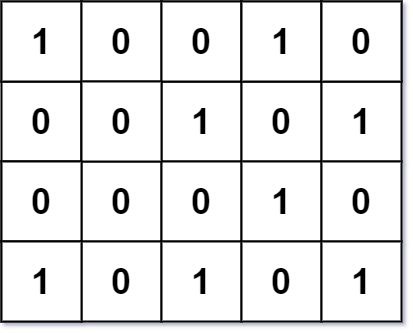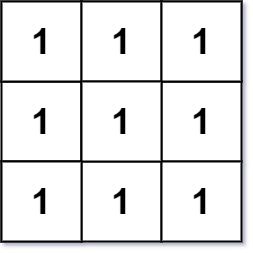| comments | difficulty | edit_url | tags | ||||
|---|---|---|---|---|---|---|---|
true |
Medium |
|
Given an m x n integer matrix grid where each entry is only 0 or 1, return the number of corner rectangles.
A corner rectangle is four distinct 1's on the grid that forms an axis-aligned rectangle. Note that only the corners need to have the value 1. Also, all four 1's used must be distinct.
Example 1:
Input: grid = [[1,0,0,1,0],[0,0,1,0,1],[0,0,0,1,0],[1,0,1,0,1]] Output: 1 Explanation: There is only one corner rectangle, with corners grid[1][2], grid[1][4], grid[3][2], grid[3][4].
Example 2:
Input: grid = [[1,1,1],[1,1,1],[1,1,1]] Output: 9 Explanation: There are four 2x2 rectangles, four 2x3 and 3x2 rectangles, and one 3x3 rectangle.
Example 3:
Input: grid = [[1,1,1,1]] Output: 0 Explanation: Rectangles must have four distinct corners.
Constraints:
m == grid.lengthn == grid[i].length1 <= m, n <= 200grid[i][j]is either0or1.- The number of
1's in the grid is in the range[1, 6000].
We enumerate each row as the bottom of the rectangle. For the current row, if both column
The time complexity is
class Solution:
def countCornerRectangles(self, grid: List[List[int]]) -> int:
ans = 0
cnt = Counter()
n = len(grid[0])
for row in grid:
for i, c1 in enumerate(row):
if c1:
for j in range(i + 1, n):
if row[j]:
ans += cnt[(i, j)]
cnt[(i, j)] += 1
return ansclass Solution {
public int countCornerRectangles(int[][] grid) {
int n = grid[0].length;
int ans = 0;
Map<List<Integer>, Integer> cnt = new HashMap<>();
for (var row : grid) {
for (int i = 0; i < n; ++i) {
if (row[i] == 1) {
for (int j = i + 1; j < n; ++j) {
if (row[j] == 1) {
List<Integer> t = List.of(i, j);
ans += cnt.getOrDefault(t, 0);
cnt.merge(t, 1, Integer::sum);
}
}
}
}
}
return ans;
}
}class Solution {
public:
int countCornerRectangles(vector<vector<int>>& grid) {
int n = grid[0].size();
int ans = 0;
map<pair<int, int>, int> cnt;
for (auto& row : grid) {
for (int i = 0; i < n; ++i) {
if (row[i]) {
for (int j = i + 1; j < n; ++j) {
if (row[j]) {
ans += cnt[{i, j}];
++cnt[{i, j}];
}
}
}
}
}
return ans;
}
};func countCornerRectangles(grid [][]int) (ans int) {
n := len(grid[0])
type pair struct{ x, y int }
cnt := map[pair]int{}
for _, row := range grid {
for i, x := range row {
if x == 1 {
for j := i + 1; j < n; j++ {
if row[j] == 1 {
t := pair{i, j}
ans += cnt[t]
cnt[t]++
}
}
}
}
}
return
}function countCornerRectangles(grid: number[][]): number {
const n = grid[0].length;
let ans = 0;
const cnt: Map<number, number> = new Map();
for (const row of grid) {
for (let i = 0; i < n; ++i) {
if (row[i] === 1) {
for (let j = i + 1; j < n; ++j) {
if (row[j] === 1) {
const t = i * 200 + j;
ans += cnt.get(t) ?? 0;
cnt.set(t, (cnt.get(t) ?? 0) + 1);
}
}
}
}
}
return ans;
}

